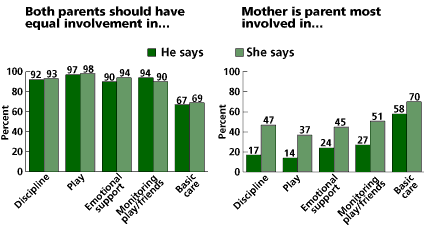
How Involved Are Fathers in Raising Children?
(December 2000) Most of the research on parenting in the United States has surveyed mothers, but not fathers. The recent surge of interest in the father’s role has promoted surveys of both parents, which have, incidentally, documented substantial discrepancies between men’s and women’s reports about their relative involvement in raising their children. A 1999 University of Maryland study explored these discrepancies by asking a sample of mothers and fathers about five domains of parenting: discipline, play, emotional support, monitoring of activities and playmates, and basic care.
Parents were asked: “Ideally, who should discipline children, mainly the mother, mainly the father, or both equally?” Similarly, respondents were also asked: “In parenting your children, who disciplines the children, mainly you, mainly the child’s father/mother, or both parents equally?” Questions were repeated for each domain of childrearing and were asked both of parents who currently had children in the home as well as of parents who had adult children.

There is overwhelming consensus between men and women that parenting should be shared equally across most domains, as shown in the figure. For four of the areas — disciplining children, playing with children, providing emotional support, and monitoring activities and friends — at least 90 percent of men and women say these parenting domains should be shared equally. More than two-thirds of men and women say that caring for children’s needs should be shared equally by mothers and fathers.
Parents’ reports of actual involvement, however, do not agree. Mothers are far more likely than fathers to report that the mother is the main disciplinarian of children (47 percent, compared with 17 percent), and that it is mainly the mother who plays with children (37 percent, compared with 14 percent). Similarly, mothers are far more likely than fathers to report that the mother provides most of the emotional support of children (45 percent compared with 24 percent) and that the mother is the one who mainly monitors their children’s activities (51 percent compared with 27 percent). More mothers than fathers believe that mothers are the main caretakers of children (70 percent vs. 58 percent). Overall, fathers are much more likely to hold the view that domains are shared equally with their partners, while mothers are much more likely to report that they are primarily the ones involved in rearing their children.
Reference
Melissa Milkie, Suzanne M. Bianchi, Marybeth Mattingly, and John Robinson, “Fathers’ Involvement in Childrearing: Ideals, Realities, and Their Relationship to Parental Well-Being.” (Revised version of a paper presented at the annual meeting of the American Association for Public Opinion Research, Portland, OR, May 18–21, 2000.)
This article is excerpted from the Population Bulletin “American Families” (Vol. 55, No. 4, December 2000), published by the Population Reference Bureau.
Suzanne M. Bianchi is professor of sociology and faculty associate in the Center on Population, Gender and Social Inequality at the University of Maryland, College Park.
Lynne M. Casper is health scientist administrator and demographer at the Demographic and Behavioral Sciences Branch, National Institute of Child Health and Human Development.
